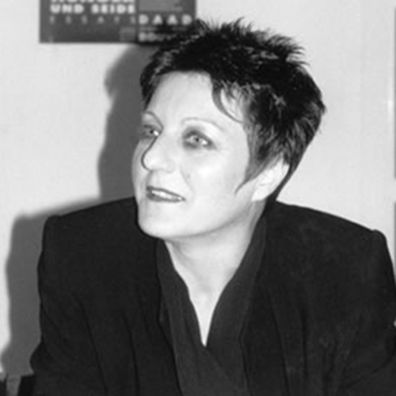Herta Müller
Germany
Writer, Winner of the Nobel Prize for Literature 2009
Guest Lectureship 1993, Guest Lectureship 1995

Herta Müller
© DAAD
She is regarded as a “chronicler of everyday life in a dictatorship”. When the Romanian-German author Herta Müller writes about oppression, fear and persecution in her novels, she knows exactly what she is talking about, because she experienced it first hand under the Romanian dictator Ceausescu.
Literary places are inner places, far away from geography.
– Herta Müller
Herta Müller was born in the Banat-Swabian part of Romania in 1953. Her mother tongue is German; she first learned Romanian at high school. After studying German and Romance languages, she started her career in 1976, working as a translator at an engineering factory. Her refusal to cooperate with the intelligence services marked the beginning of her life of suffering: interrogation, surveillance, periods of unemployment, later a ban on travelling and publishing. She was a member of the Banat Action Group, an association of Romanian-German authors who, as a German-speaking minority in a dictatorship, pursued a policy of all-German literature. In 1975 the group was dissolved and persecuted.
In 1987, the writer moved to the Federal Republic of Germany. Today, she lives in Berlin. With DAAD support, she taught as a guest lecturer at Warwick, UK, in 1993, then at the University of Lisbon, Portugal, in 1995. Her novels, like Der Fuchs war damals schon der Jäger (1992), and The Land of Green Plums (Herztier, 1994), as well as her collection of essays, Der König verneigt sich und tötet (2003), deal with physical and mental states in a totalitarian regime, with the perpetrator generation of parents and with emigration. Similarly, her book Vater telefoniert mit den Fliegen, published in 2012, tells of flight, violence, homesickness and uprooting. Yet she is not only concerned with experience in Romania. In a lecture on poetry she says: “Poetic places are internal places, far away from geography.”
In May 2004 the author, who already holds many awards and prizes, received the Konrad Adenauer Foundation Prize for Literature in Weimar, worth 15,000 euros. Stating their reasons for conferring the award, the jury stated that she had “protested against decreed thinking and the incapacitation of speech,” and had “committed herself to fundamental democratic values.” In 2005 she received the Berlin Prize for Literature, and in 2006 was presented with the Würth Prize for European Literature and the Walter-Hasenclever Prize for Literature.
In 2007/2008, the author received a scholarship awarded by the International Art House Villa Concordia in Bamberg. In 2009 Müller received the Ehrengabe (Testimonial) of the Heinrich Heine Society and the Franz Werfel Human Rights Award. In the same year the Academy of Sciences in Stockholm awarded Herta Müller the Nobel Prize for Literature. In 2010 she received the Grand Cross with Star for Distinguished Service of the Order of Merit of the Federal Republic of Germany. In 2011 she was awarded the Monismanien Prize, which honours personalities and institutions who champion the uncensored right to freedom of expression. In 2012 Herta Müller received an honorary doctorate from the Faculty of Arts and Humanities at Paderborn University, and in June 2015 the City of Cologne decided to award her the Heinrich Böll Prize.